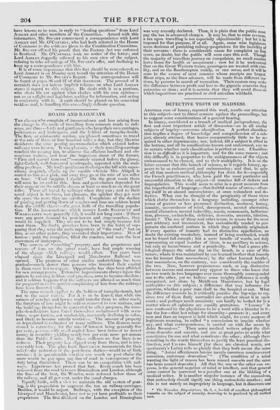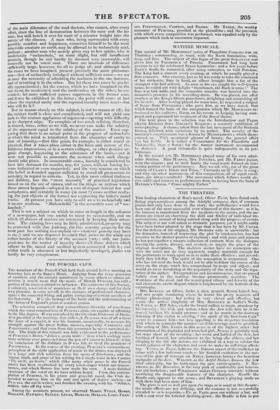DEFECTIVE TESTS OF MADNESS.
ANOTHER case of lunacy, reported this week, recalls our attention to this subject—riot to direct censure against the proceedings, but to suggest some considerations of a general bearing.
In lunacy, considered as a branch of medical jurisprudence, the first and most important article of discussion—as in all similar subjects of' inquiry—concerns class cation. A perfect classifica- tion implies a degree of knowledge and comprehension of a sub- ject, already attained, that leaves comparatively little to be ac- quired in other departments ; nor, indeed, till a subject is sifted to the bottom, and all its ramifications known and understood, can we be certain whether such classification is perfect or not. Classifies. tion is as difficult as it is important, and for the same reason ; and this difficulty is in proportion to the ambiguousness of' the objects endeavoured to be classed, and to their multiplicity. It is on the latter account that this branch of science, as it regards lunacy, ap- pears to be so embarrassed, and embarrassing; and that, in spite of all that modern medical philosophy has done for it—especially the French practitioners, who have paid the most particular and successful attention to the subject—it remains full of defects and improprieties. This would vein to arise in a great measure from the imperfection of language,—that fruitful source of error,—show- ing itself in an absurd nomenclature, at OMB redundant and de- fective. What can be thought of the perspicuity of those views which clothe themselves in n language including, amongst other terms of greater or less presumed distinction, madness, lunacy, insanity, unsoundness of mind, derangement, mental aberration, mental alienation, mental imbecility, mania, monomania, hallucina- tion, phrensy, melancholia, delirium, dementia, amentia, idiotism, fatuity ? The use of these and other terms, in senses thr the most part arbitrary and inconsistent, has undoubtedly tended to per- petuate the confused notions in which they probably originated. If every species of insanity had its distinctive appellation, no doubt the existing vocabulary, instead of being overloaded, would not be found full enough ; but a mere bundle of words, not duly representing an equal number of ideas, is no auxiliary to science, but only an incumbrance and a perplexity. We had ft grave phi- lological dispute the other day on the bench, in a case of this nature, where it was maintained by one learned brother that insanity was far instiller than unsoundness ; by the other learned brother, that sossousdness, on the contrary, was considerably the madder of' the two. Now, however preposterous such, or any distinction between insanns and unsound may appear to those who know that no two words in two languages ever more thoroughly corresponded one to the other, yet we believe some weighty difference is really recognized, not alone by Middlesex Magistrates, but by legal authorities on this subject ; a difference that may influence the question, whether a poor man shall to the hospital or not. What the difference consists in, it evidently puzzles the big-wigs to say, since two of them flatly contradict one another about it in open court ; and perhaps much unanimity can hardly be looked for in a matter where all opinions are equally gratuitous. " Lunacy" is now confessed by the physicians to be a word with a blunder in it ; but the law—that last refuge for absurdity—protects it ; and every now and then an inquest is held which might, for every purpose of legitimate meaning, be called "a commission to inquire whether any, and what correspondence, is carried on with the moon by John So-and-so." Then sonic medical writers adopt the divi- sions dementia and amentia, and are at great pains to settle what constitutes the one and what constitutes the other ; although there is nothing in the words themselves to justify the least practical dis- tinction, and Cuomo himself (for these are classical words, not apothecary's Latin) tells us plainly that they both meant the same thing. "Anhui affectionem lumine mentis carentem nominaverunt mentiam, eademque dementiam." * (The condition of a mind wanting the light of reason has been named amentia and the same has been named dementia.) All that the one or the other can ex- press, is the general negation of mind or intellect, and that general sense cannot be narrowed to a peculiar one at the bidding of a medical writer. It is another singular instance of the anomalous, that melancholy should signify one thing, melancholia another; and this is not merely an impropriety in language, but it discovers one
* The Tuseulan Disputations, lib. 3, c. 5—full of excellent philosophical remarks on the subject of insanity, deserving to be pondered by all medical men. of the main dilemmas of the mad doctors, who cannot, after every effort, draw the line of demarcation between the sane and the in- sane, but still botch it over for want of a minuter insight into the nature of the disease. A man who, being surrounded with every possible comfort and happiness, conceives himself to be the most miserable creature on earth, may be allowed to be melancholy mad, perhaps ; another man who merely gives way to low spirits, who is moderately "melancholy," on some slight, but still insufficient grounds, though he can hardly be deemed very reasonable, will a‘ ssuredly not be voted mad. These arc intervals of difference sufficiently large, however, for all to judge of; and although both the cases we have imagined present precisely the same phenome- non—that of' melancholy indulged without sufficient cause—we see at once the necessity of admitting the madness in the one instance, and of rebutting it in the other. But let these two cases be gradu- ally approximated ; let the excess, which we have imagined on the one hand, be moderated, and the moderation on the other, be ex- ceeded; let more sufficient causes supervene in the former case, and fewer be exhibited in the latter ; the point will come at last where the reputed sanity and the reputed insanity must meet—but who will fix it ?
Not to reason closely on this subject, is not to reason at all; for the subject itself is close and complicated, and will not yield one inch to the coarser appliances of argument—opening with difficulty to its sharpest edge. To complain of too much refining, therctiwe, is absurd, since, refine as we will, we never can make the subtlety of the argument equal to the subtlety of the matter. Even sup- posieg that there is an actual point in the progress of melancholia at which the mind is transferred from the character of sanity to that of insanity,—that this point, for example, is either moral or physical, that it takes place either in the force and nature of the ihtuitous impressions, or in a certain collapse, or other positive or- ganic change, happening to the substance of the brain,—yet it were not possible to announce the moment when such change should take place. In innumerable cases, insanity is considered to have lain dormant for months, nay, for years, without having be- come indicated or even suspected; and the very reasons on which this belief is founded appear sufficient to annul all pretensions to certainty in regard to criteria. Yet, in this most critical darkness and dubiety, has the "stern necessity" of practical legislation forced us on the use of names, and on the things or actions which those names bespeak—adopted in a sort of despair betwixt law and metaphysics, and certainly in many (in most ?) cases neither realiz- ing the just objects of the former nor expressing the latter's moral truths. At present you have only to add an a to melancholy and it means madness. "Melancholia" is the accusative ease of " me- lancholy."
This is not a subject on which to enter at length in the columns of a newspaper, but one useful to recur to occasionally, and on which all classes of readers are interested in keeping their atten- tion. The existing laws may be fairly administered, property may be protected with due jealousy, (in this country property for the most part has nothing to complain of—whatever poverty may have to say,) and we are disposed to admit that juries on the whole are rather tender of the liberty of the accused party: still, our juris- prudence in the matter of insanity shows all those defects which adhere to the moral and medical system connected with it ; and whilst truth is obscured or but imperfectly developed, justice can hardly be very conspicuous.



























 Previous page
Previous page